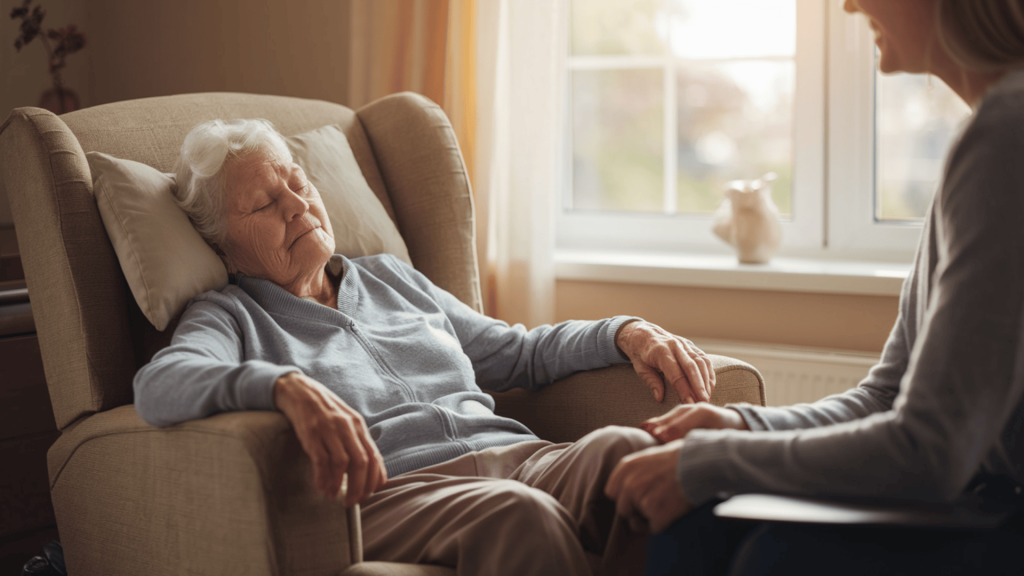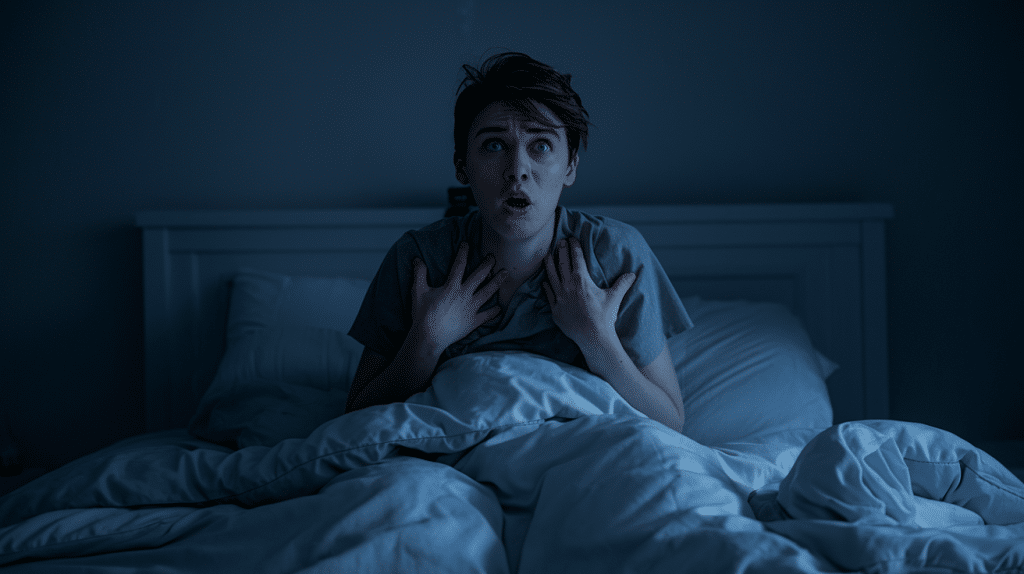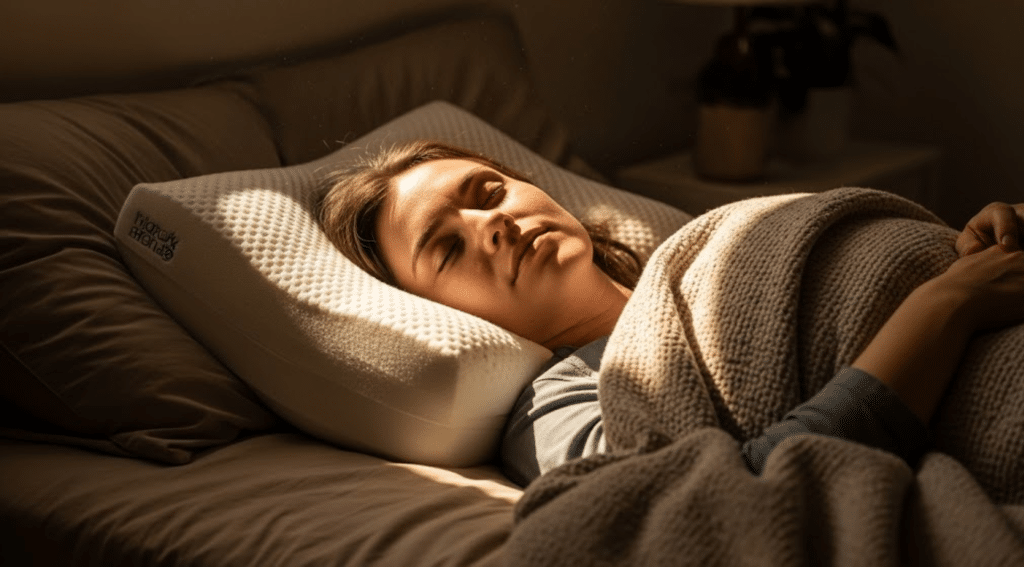Ever feel like crashing for a nap right after you eat? I’ve definitely been there, and you’re not alone. That sluggish, sleepy feeling hits a lot of us. But is feeling sleepy after eating a sign of diabetes, or just a normal response to a big meal?
I’ll walk you through what’s happening in your body, how food affects your energy, what role blood sugar plays, and when that tiredness might be a red flag.
You’ll also get a few simple tips to help you avoid that post-meal slump and feel more alert.
If you’ve been wondering if your drowsiness is normal or something more, let’s figure it out together.
Understanding Post-Meal Sleepiness
Ever notice how you get drowsy after a big meal? This happens to almost everyone. Your body goes through several changes when you eat. Blood sugar levels rise quickly, especially if you’ve had a lot of carbs or sugar, and then often drop. That’s why you might feel sleepy after eating sugar in particular.
This roller coaster makes you tired. Your brain also releases chemicals, such as serotonin, that promote sleepiness. The hormone insulin works hard to process all that food. This effort drains your energy.
Studies indicate that approximately-
85% of people experience post-meal fatigue on a regular basis. Even healthy adults feel this drowsiness within 30 minutes of eating.
For people with diabetes, this tiredness can be much stronger.
Their blood sugar swings are often bigger and last longer. Large meals with a high carb or sugar content trigger the strongest sleepy feelings. Your body simply needs energy to digest food properly. Think of it like your internal engine working overtime after fueling up.
Is Feeling Sleepy After Eating a Sign of Diabetes?

Post-meal sleepiness can sometimes signal diabetes, especially when it’s very severe. Understanding blood sugar problems and other warning signs helps you recognize when to be concerned.
Blood Sugar and Fatigue: A Diabetic Perspective
For people with diabetes, post-meal sleepiness can be much more intense. Their bodies struggle to control blood sugar properly. When blood sugar shoots up too high after eating, it’s called hyperglycemia. This makes you feel sleepy and sluggish. Your cells can’t use all that sugar for energy effectively.
Sometimes blood sugar then crashes too low, causing hypoglycemia. This sudden drop also triggers severe fatigue and drowsiness. Is falling asleep after eating sugar a sign of diabetes? It could be, especially if it happens regularly after sweet treats or sugary drinks.
Think of it like a car engine sputtering when it gets bad fuel. People with diabetes experience these wild swings more often than healthy individuals.
Their insulin either doesn’t work well or isn’t made in enough amounts. This constant battle with blood sugar levels leaves them feeling exhausted after most meals. The tiredness can last for hours instead of just minutes.
Symptoms to Watch For
Pay attention to these warning signs that may indicate diabetes requires medical attention.
- Feeling incredibly thirsty throughout the day, even after drinking plenty of water regularly
- Needing to urinate much more frequently than usual, especially waking up multiple times nightly
- Losing weight without trying to diet or changing your eating habits significantly lately
- Having blurry vision that comes and goes, making it hard to focus clearly
These symptoms, combined with severe post-meal fatigue, deserve a doctor’s evaluation for proper testing.
Other Possible Causes of Sleepiness After Eating
Diabetes isn’t the only reason you might feel extra tired after meals. Sleep problems, food reactions, and hormone issues can all make post-meal drowsiness worse.
1. Sleep Apnea and Fatigue
Sleep apnea makes you stop breathing during sleep, leaving you exhausted all day. People with this condition feel especially drowsy after eating because their bodies already lack energy.
Other sleep disorders, like restless leg syndrome, also worsen post-meal tiredness. Poor sleep quality means your body can’t handle the normal energy dip after meals. Getting a sleep study can help identify these hidden problems.
2. Food Intolerances
Your body might be reacting poorly to certain foods without you realizing it. Gluten intolerance can cause severe fatigue within hours of eating bread or pasta. Lactose intolerance from dairy products also triggers exhaustion and digestive upset after meals.
These reactions force your immune system to work overtime, draining your energy reserves. Keep a food diary to spot patterns between specific foods and tiredness.
3. Hormonal Imbalances
Thyroid problems can make normal post-meal sleepiness feel much worse than usual. An underactive thyroid slows down your entire metabolism, including how you process food.
Pregnancy hormones also increase fatigue, especially after eating larger meals during the early stages of pregnancy. Other hormone issues, like adrenal fatigue, can leave you feeling drained after eating. Blood tests can help determine if your hormones are functioning properly.
Tips to Reduce Sleepiness After Eating
You don’t have to accept feeling drowsy after every meal as a normal part of life. These simple strategies can help you maintain steady energy throughout the day.
- Eat smaller meals more frequently instead of three large ones to keep blood sugar stable.
- Choose complex carbs like oats and quinoa over sugary snacks that cause energy crashes later
- Include lean protein with every meal to slow down sugar absorption and maintain energy longer.
- Take a short 10-minute walk after eating to boost circulation and aid your body’s digestion of food.
- Stay hydrated throughout the day, as even mild dehydration can exacerbate post-meal tiredness.
Making these changes gradually will help your body adjust to new eating and lifestyle patterns. Most people notice an improvement in energy levels within just a few weeks of trying these tips.
When You Should See a Doctor?

If you often feel sleepy after eating sugar, and the feeling persists, it may be time to consult a doctor. Pay attention if you notice other symptoms like excessive thirst, frequent urination, or blurry vision, as these could be signs of diabetes.
Also, if you feel unusually tired, lose weight without trying, or experience tingling in your hands or feet, it’s a good idea to consult a doctor.
These symptoms may indicate a more serious condition than just post-meal fatigue. If sleepiness affects your daily routine or happens regularly after meals, seeking medical advice is important. A doctor can help determine the cause.
Final Words
Now you have a better understanding of why post-meal drowsiness happens and how to tell if it’s something to be concerned about.
If you’ve been wondering, is feeling sleepy after eating a sign of diabetes? The answer is, it can be, especially when paired with other symptoms.
Take a moment to reflect on your meals, energy levels, and any patterns you’ve noticed. A few small changes in your diet and habits may help you feel more alert.
But if that tiredness sticks around or comes with other warning signs, talk to your doctor.
Looking for more helpful wellness tips? Read other blogs on the website for practical advice you can use every day.











